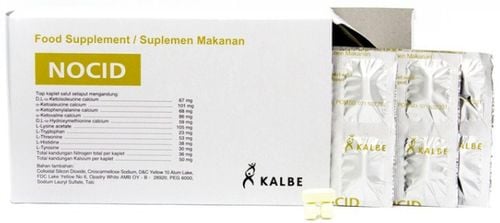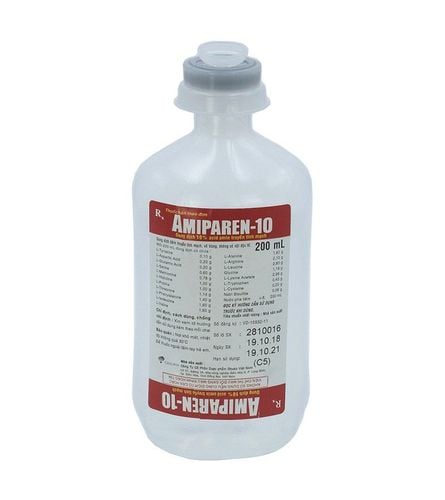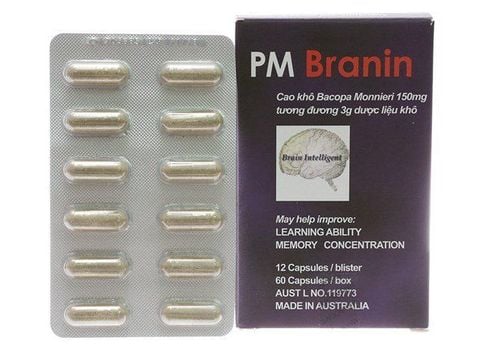This is an automatically translated article.
Tyrosine is one of the essential amino acids and can be supplemented by the body through daily foods. Tyrosine increases levels of the neurotransmitters dopamine, adrenaline, and norepinephrine, which help regulate mood, improve memory, alertness, and increase concentration.
1. What is Tyrosine? Function
Tyrosine is one of 20 amino acids that are produced naturally in the body from another amino acid called phenylalanin. This is a non-essential amino acid.
Tyrosine can be easily found in many foods such as fish, chicken, dairy products, protein-rich foods, especially in cheese, where it was first discovered. In fact, “tyros” means “cheese” in Greek
Tyrosine helps create important substances, such as:
Dopamine : Dopamine is important for improving motor skills Movement, mood, in addition are also very important for memory. Adrenaline and noradrenaline: These hormones appear when the mood is stressed. They are responsible for reactions against stressful situations, releasing energy. Thyroid Hormones: Thyroid hormones are produced by the thyroid gland and they are primarily responsible for regulating metabolism. Melanin: Pigment to give color to skin, hair and eyes. For example, dark-skinned people have more melanin in their skin than light-skinned people. Tyrosine is also now available as a dietary supplement. You can easily buy medicine to use. Tyrosine supplements help increase levels of the neurotransmitters dopamine, adrenaline, and norepinephrine. By increasing levels of these neurotransmitters, it improves memory and performance in stressful situations.
Tyrosine improves mental performance in stressful situations Stress can negatively affect reasoning, memory, attention, and knowledge by reducing neurotransmitters nerve.
Additionally, tyrosine supplements have been shown to be beneficial for people who are sleep-deprived. Tyrosine supplementation may reverse mental decline and improve cognition in stressful or mentally demanding situations. Although tyrosine may provide cognitive benefits, there is no evidence that it enhances physical performance.
Finally, there are no studies to show that taking tyrosine supplements in the absence of a stressor can improve mental performance. In other words, it won't increase your brain power.
Tyrosine works for people with Phenylketonuria Phenylketonuria (PKU) is a rare genetic disease in humans caused by a defect in the gene that makes the enzyme phenylalanine hydroxylase.
The human body uses this enzyme to convert phenylalanine to tyrosine, which is used to make neurotransmitters. Without this enzyme, the body cannot break down phenylalanine, which accumulates in the body.
To treat PKU, the patient needs to follow a special diet, limiting foods containing phenylalanine. However, tyrosine is made from phenylalanine, so people with PKU may have tyrosine deficiency. When missing, it affects behavior problems. Therefore, patients need to supplement with tyrosine to reduce symptoms.
Tyrosine is effective in treating depression Depression occurs when neurotransmitters in the brain are out of balance. Antidepressants are often prescribed to help nourish brain cells, arrange disturbances in the transmission of nerve conflicts to balance. Tyrosine helps increase the production of neurotransmitters so it is thought to act as an antidepressant.
However, the point here is that depression is a complex and varied disorder, so this could be why a supplement like tyrosine is not effective in combating the symptoms. its. Therefore, for people with depression, low levels of dopamine, adrenaline or noradrenaline may be effective when supplementing with tyrosine.
In a statistical study of people with depression due to a lack of dopamine, it was found that tyrosine provided clinically significant benefits

Tyrosine có hiệu quả trong chữa bệnh trầm cảm
2. Side effects when using Tyrosine
Tyrosine is considered safe if used in the correct dosage. It can be safely supplemented according to individual weight at a dose of 150 mg/kg per day for up to three months.
However, it can still cause side effects and interact with medications
Monoamine Oxidase Inhibitors (MAOIs) Tyramine is an amino acid that helps regulate blood pressure and is produced by the breakdown of tyrosine. Tyramine accumulates in food when tyrosine and phenylalanine are converted to tyramine by an enzyme in microorganisms.
Cheeses, smoked meats, soy products and beer contain high levels of tyramine.
Antidepressants called monoamine oxidase inhibitors (MAOIs) block the enzyme monoamine oxidase, which breaks down excess tyramine in the body. Combining monoamine oxidase inhibitors with tyramine-rich foods can cause dangerously high blood pressure.
However, it is not known whether tyrosine supplementation can lead to tyramine accumulation in the body, so caution should be exercised by people taking MAOIs.
Thyroid hormones The thyroid hormones triiodothyronine (T3) and thyroxine (T4) help regulate growth and metabolism in the body.
Tyrosine supplements may affect these hormones because tyrosine is a building block for thyroid hormones, so taking it may raise their levels too high. Therefore, tyrosine supplements should be used with caution in people who are taking medication for an overactive thyroid or thyroid gland.
Levodopa (L-dopa) Levodopa (L-dopa) is a medication commonly used to treat Parkinson's disease. In the body, L-dopa and tyrosine compete for absorption in the small intestine, which can affect how well the drug works. The two drugs should be taken a few hours apart.
Interestingly, tyrosine is being studied to relieve some of the symptoms associated with cognitive decline in older adults.
3. How to supplement Tyrosine for the body. Dosage
As a supplement, tyrosine is available as a free amino acid or N-acetyl L-tyrosine (NALT). NALT is more soluble in water than its free form, but it has a low conversion rate to tyrosine in the body. Therefore, a larger dose of NALT than tyrosine is required to obtain the same effect, making the free form the preferred choice.
Tyrosine is usually taken in doses of 500–2,000 mg, used 30–60 minutes before exercise. Its benefits on exercise performance, though, have yet to be clearly defined.
Taken at a dose of 100–150 mg per kg according to body weight, it helps to stay mentally alert, focus in situations of physical stress or suffer from insomnia.
If used in higher doses, it may cause digestive upset. When used, it should be divided into two separate doses, taken 30 and 60 minutes before a stressful event.
Please dial HOTLINE for more information or register for an appointment HERE. Download MyVinmec app to make appointments faster and to manage your bookings easily.
Reference source: healthline.com












